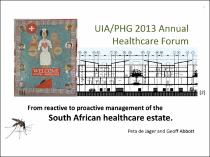JavaScript is disabled for your browser. Some features of this site may not work without it.
- ResearchSpace
- →
- Research Publications/Outputs
- →
- Conference Publications
- →
- View Item
| dc.contributor.author |
De Jager, Peta

|
|
| dc.contributor.author |
Abbott, G

|
|
| dc.date.accessioned | 2013-11-12T05:32:27Z | |
| dc.date.available | 2013-11-12T05:32:27Z | |
| dc.date.issued | 2013-09 | |
| dc.identifier.citation | De Jager, P and Abbot, G. 2013. From reactive to proactive management of the South African healthcare estate. In: UIA/PHG 2013 Annual Healthcare Forum, Canada (Toronto), September 2013 | en_US |
| dc.identifier.uri | http://hdl.handle.net/10204/7051 | |
| dc.description | UIA/PHG 2013 Annual Healthcare Forum, Canada (Toronto), September 2013. | en_US |
| dc.description.abstract | Healthcare spending in South Africa is inequitably distributed across the private and public sectors. Treasury reports that 49 % of expenditure is attributable to the private sector in the service of 16% of the population. This expenditure pattern has undermined aspirations of equity, access to care and social justice. Furthermore it has been widely acknowledged that much of the public health architecture represents a legacy estate, with poor replacement rates and a generally weak culture of facility maintenance. In light of this, there has been a commitment to transform the healthcare sector through the introduction of the national health insurance system, which is to be phased in over a 14 year period. This, coupled with a renewed focus on infrastructure investment by government, will surely lead "over time" to a substantially transformed healthcare estate. Historical implementation partners "the departments of public works" are increasingly being displaced by the introduction of cadres of built environment specialists in the employment of the respective provincial health departments wishing to meet their own specialised needs more directly. As the core mandate and skill is not built-environment-related this transition is posing interesting challenges. | en_US |
| dc.language.iso | en | en_US |
| dc.relation.ispartofseries | Workflow;11726 | |
| dc.subject | Norms | en_US |
| dc.subject | Health care services | en_US |
| dc.subject | Service delivery | en_US |
| dc.subject | Healthcare sector | en_US |
| dc.subject | Healthcare forum | en_US |
| dc.subject | Hospital design | en_US |
| dc.title | From reactive to proactive management of the South African healthcare estate | en_US |
| dc.type | Conference Presentation | en_US |
| dc.identifier.apacitation | De Jager, P., & Abbott, G. (2013). From reactive to proactive management of the South African healthcare estate. http://hdl.handle.net/10204/7051 | en_ZA |
| dc.identifier.chicagocitation | De Jager, Peta, and G Abbott. "From reactive to proactive management of the South African healthcare estate." (2013): http://hdl.handle.net/10204/7051 | en_ZA |
| dc.identifier.vancouvercitation | De Jager P, Abbott G, From reactive to proactive management of the South African healthcare estate; 2013. http://hdl.handle.net/10204/7051 . | en_ZA |
| dc.identifier.ris | TY - Conference Presentation AU - De Jager, Peta AU - Abbott, G AB - Healthcare spending in South Africa is inequitably distributed across the private and public sectors. Treasury reports that 49 % of expenditure is attributable to the private sector in the service of 16% of the population. This expenditure pattern has undermined aspirations of equity, access to care and social justice. Furthermore it has been widely acknowledged that much of the public health architecture represents a legacy estate, with poor replacement rates and a generally weak culture of facility maintenance. In light of this, there has been a commitment to transform the healthcare sector through the introduction of the national health insurance system, which is to be phased in over a 14 year period. This, coupled with a renewed focus on infrastructure investment by government, will surely lead "over time" to a substantially transformed healthcare estate. Historical implementation partners "the departments of public works" are increasingly being displaced by the introduction of cadres of built environment specialists in the employment of the respective provincial health departments wishing to meet their own specialised needs more directly. As the core mandate and skill is not built-environment-related this transition is posing interesting challenges. DA - 2013-09 DB - ResearchSpace DP - CSIR KW - Norms KW - Health care services KW - Service delivery KW - Healthcare sector KW - Healthcare forum KW - Hospital design LK - https://researchspace.csir.co.za PY - 2013 T1 - From reactive to proactive management of the South African healthcare estate TI - From reactive to proactive management of the South African healthcare estate UR - http://hdl.handle.net/10204/7051 ER - | en_ZA |






